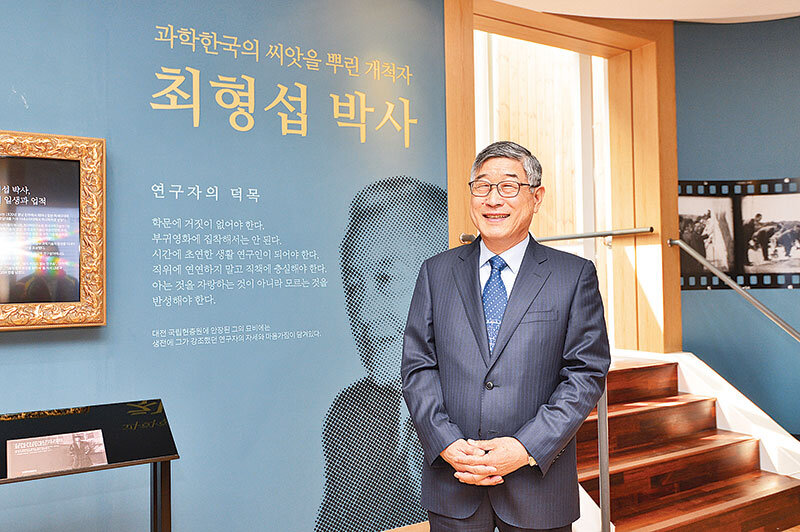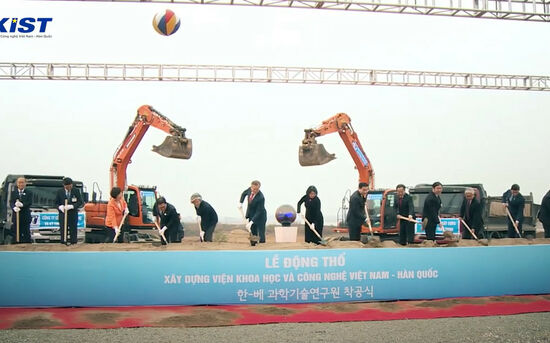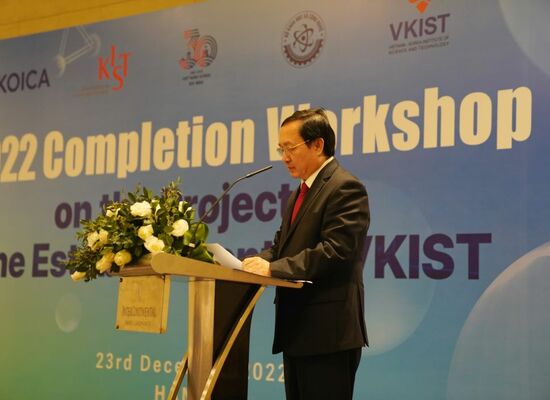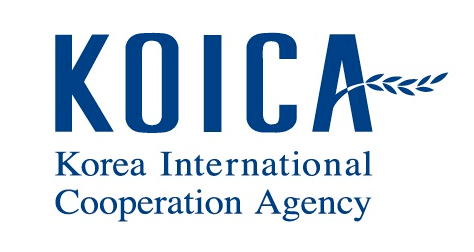However, industrial research is not only applied research but can still lead to discovering new knowledge, writing scientific papers and technological research to register patents.
Do things that you haven't done yet
Why are information technology and biotechnology the two main areas that VKIST focuses on?
In fact, I did not choose these two areas. Right when your government asked the Korean Government to help build a research institute, they decided it would focus on biotechnology and information technology.
I think the reason for this option is quite obvious. These are two areas that are very dynamic and many countries believe that it is the field of the future, the high-tech sector.
However, when it comes to biotechnology, we only think of pharmaceuticals and medical devices. But here, Vietnam offers a different idea. It is post-harvest processing technology, medicines and herbs. The reason for this choice is because agriculture in Vietnam is still playing an important role in the economy.
Currently, Vietnam is a country with a huge export volume of agricultural products such as coffee, rice, cashew nuts, but the value of these products is not high. Therefore, Vietnam needs to focus on post-processing technologies so that agricultural products have higher value. As for medicine and herbs, you have a land stretching from the North to the South with diverse flora and traditional medicine that many people think that have not been fully exploited.

Mr. Kum Dongwha, Director of VKIST, was also Director of KIST from 2006-2008. In the photo: Mr. Kum Dongwha at KIST Museum. Source: VKIST
IT field is one of the fastest growing fields in Vietnam's industrial sector. However, from a macro perspective, Vietnam does not produce hi-tech products but only assembles. Therefore, it is understandable that you want to strive to create more valuable products in this field, which is the orientation of the Vietnamese Government so far.
Another reason, probably because this is a joint project between Vietnam and Korea, the fields of choice are also based on the strength of Korea.
More than a year ago, VKIST made the Industrial Survey Report. What discoveries have you made from that?
When conducting the survey, we prefer to talk to people from the business sector, rather than policy makers and university professors.
What we have learned is quite common and frequent in developing countries, that is, the companies mainly import equipment, raw materials to produce products, leading to Vietnam. is a low industrialized country.
How do the survey results help you in running VKIST?
There are three things. One is to reaffirm what we heard earlier about Vietnam, about the qualifications of people who are working in the factory, on the construction site.
Second, the survey participants suggested that we do what other universities and research institutes do not or cannot do, such as creating a multi-stakeholder research platform and environment. ; or doing things close to the practical application, such as in the field of medicines and herbs, we are advised to focus on the herbal extraction process.
The survey also pointed out that we should choose areas where the government can create markets or have control of the internal market, such as when Vietnam advances to 5G networks or power grids. Intelligence, there are many components and devices that we can participate in research.

The launch of VKIST on November 21, 2017 in Hanoi with the presence of Deputy Prime Minister Vu Duc Dam. Source: VKIST
Industrial research is not limited to international publication
VKIST can be considered a "key" research institute in applied-oriented research. Before that, Vietnam had many funding programs for applied research but the results were quite limited. What innovations does VKIST have in terms of designing, evaluating, and implementing applied research to bring lab results to market within 5 years as your plan?
It is true that converting research results into applied products is not easy, especially for individuals, organizations or countries with little experience. My suggestion is nothing new. We will start with what the industry requires. Then, based on how well other research facilities served the business's goals, focusing on what areas, we would locate ourselves. I say 5 years is only for comparison (with basic research) but in fact many technologies may only need to develop in six months, a year but sometimes it takes more than 5 years.
I think my mission is to show people what an example of industrial research is. I want to use the term "industrial research" instead of the phrase "applied research". Because the industry does not only need to use every application, it also needs basic scientific knowledge. We can still look forward to discovering new knowledge, writing scientific papers, researching technology for patent registration.
The initial mission of VKIST is to create close relationships with the business sector, try to understand them, make friends with them. It is my wish that VKIST will be widely known as an industry research organization and companies operating in the field of information technology and biotechnology think of us when we have production problems. That is the "brand" that I want to build for VKIST.
Minister Chu Ngoc Anh made an important suggestion that we should work with companies with R&D capacity, those who really want to improve technology, not only develop based on low labor costs or have a good source of investment. Choosing to work with someone is a necessity because we do not have a role to improve technology absorption capacity for the whole of Vietnam. Now, we are still very young and even 10 years from now, we are still young in that mission.
Therefore, we will only focus on a number of specific, business-specific issues. At the same time, we will create deserving treatment for scientists and engineers to make them satisfied with their career.
What are your challenges in organizing industrial research in Vietnam?
You country invest in industrial research just the same as investing in writing an article. For me, it is a great challenge to create practical applications, because we need more than that. We always need know-how that no book tells us. So we have to find and collaborate with people who really want to develop their own knowhow.
Another thing is that if we want to work with industry, we need not only people who understand and have experience in this field but also people with very different minds. Maybe, it is difficult for professors and doctors to work on specific jobs in factories, dirty jobs. I don't have the answer about how to convince them yet.
However, I have a strong belief that even when conducting industrial research, if done well, there is always a way for international publication. I never want to lower the level of writing an article or patent application, but I want them to do the opposite. Good work on what will already be published. That's a different way of doing things but for the closer work of the country. I can take myself as an example, then set up a group of people who have similar views and work hard.

The headquarters of VKIST is expected to be built in Hoa Lac Hi-Tech Park by 2020. However, the installation of equipment and the building of the research team have been started from now on. Source: KIST and dongascience
Need to invest more for equipment
In order to create a foundation for VKIST's activities, which jobs do you prioritize?
This is a cooperation program between Vietnam and Korea, lasting for four years. An organization within four years is not mature enough to grow and understand what it will do. The building itself is not invested in the critical mass we need to be able to compete in Vietnam. But if the goal of competition in Vietnam after some time does not make much sense, it must take into account the competition in the Asian market, then the whole world, along with the development of the economy. .
Next, we need a good operating system. Good means it is friendly to researchers and competent to earn research funding and thus can pay scientists. The current amount of ODA from the two governments is not enough to create a good research environment.
In 1965, the US Government provided KIST with 5 million USD for 5 years but the Korean Government gave 2.5 times more. As a result, many new buildings and equipment were built. If only $ 5 million initially it will be difficult to turn KIST into a typical. VKIST must find more investment, especially for equipment as ODA currently focuses on office construction.
In this regard, I wish that the Government of Vietnam should increase its support for VKIST to carry out its mission. And of course, if we have the capacity to win the trust of the industry, I am confident that the government will do so.
In the case of KIST in Korea it seems like the opposite is happening - the government will support first and then KIST will expand to the business sector?
As I have mentioned many times, Vietnam at this time is much better than Korea at the time KIST was born. The Korean government had to support the development of the industrial bloc because at that time [in 1965] we had no significant industrial sector. The government decided to focus on shipbuilding, metallurgy, petrochemical refining, receiving investment from abroad, pouring into domestic companies and turning them into Cheabols today.
That's why KIST initially had only government contracts and government-invested companies. But the environment in Vietnam is now better than Korea before with many businesses and a certain industrial background. This is an advantage for research institutes to obtain contracts from the industrial sector.
Sincerely thank you.












